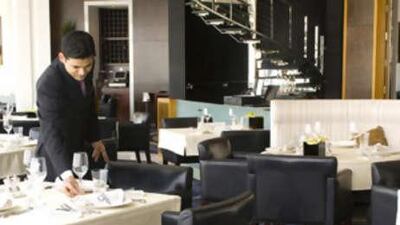The biggest challenge facing the global hospitality sector is finding talented hotel staff, said David Crowl, the vice president for sales and marketing for Four Seasons in Europe, Middle East and Africa. The problem is particularly acute in the Gulf, partly as a result of the rapid growth of tourism, said Nirbikh Goel, the director of Human Resources at the South West Asia divisional office of Hyatt International in Dubai.
"There is a clear gap between the number of rooms being built in the region and the number of trained staff that are available," he said. The problem has been exacerbated by global competition, which has led many countries in Europe to turn to head hunters to find both experienced managers and trained staff in the Middle East. "This is making the situation worse here and our advice is that, in order to retain your staff, you need to keep them happy in terms of salary and living standards," said Arthur de Haast, the global chief executive of Jones Lang LaSalle Hotels, an international hotel advisory group.
The UAE's hospitality industry is almost 100 per cent staffed by expats, mainly from Asian countries such as India, the Philippines, Thailand and Sri Lanka. But, with the improved economic situation in these countries, many are choosing to stay in their homelands. "India is a very good example of this. Before we used to bring people over from India to work here and pay a salary which is 20 per cent more than they get at home. But now they are refusing [to accept that] because salaries in India are a lot better and they find it not worthwhile to more outside their country," said Mr de Haast.
According to Christophe Landais, the managing director in the Middle East of the French hotel chain, Accor Hospitality, the solution lies in finding alternative sources for staff. He said that his company has looked further East and brought in people from China. However, he said, this solution came with its own problems. "Let me make one point clear, there is no shortage in human resources. But there is a shortage in trained human resources," said Mr Landais.
"And many of the people we bring in from China don't even speak English," he said. As a result Accor has hired its own English teachers to teach the new Chinese recruits. The French group aims to open 20 properties in the UAE by the end of 2011, which makes its investment in staff worthwhile. "The faster we expand, the more profits we will be making," said Mr Landais. Mr de Haast, at Jones Lang LaSalle, has been concerned about the level of service that such new staff can offer.
"Many of the people that are brought in from various Asian countries right now have never seen a five-star hotel in their life and are simply overwhelmed when they first come here," he said. "So how can they provide quality service to five star guests?" Mr de Haast said. Countries with more mature tourism industries, such as South Africa, have shown that employing more national staff can be part of the solution.
According to Jabu Mazbuza, chairman of the South African Tourism Authority, that is a more sustainable solution since expats are more likely to leave after a certain period. "Economies cannot survive by expatriate labourers," he said. "That's why the government has to encourage more nationals to get jobs in all sectors." The Abu Dhabi Tourism Authority (Adta) announced last week its goal of having more than 1,000 Emiratis employed in the hospitality sector in five years time.
"This is part of our Emiratisation program, and we are also working with institutions to improve [training] programmes," said Mubarak al Muhairi, director general of Adta. This week Zayed University announced a new course, called Master of Arts in Tourism Communication, which will be offered to Emirati graduates for the first time later this year. bakr@thenational.ae

